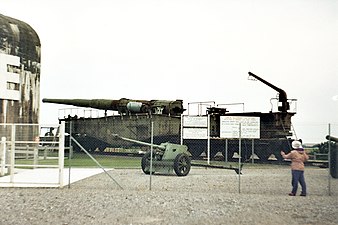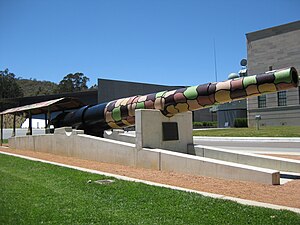
Railway gun
A railway gun, also called a railroad gun, is a large artillery piece, often surplus naval artillery, mounted on, transported by, and fired from a specially designed railway wagon. Many countries have built railway guns, but the best-known are the large Krupp-built pieces used by Germany in World War I and World War II. Smaller guns were often part of an armoured train. Only able to be moved where there were good tracks, which could be destroyed by artillery bombardment or airstrike, railway guns were phased out after World War II.
Not to be confused with Railgun, a weapon that propels projectiles by means of an electromagnetic field.History[edit]
19th century[edit]
The idea of railway guns was first suggested in Russia in 1847 by Gustav Kori (proposal),[5] followed by Ye. Repin (project, 1855), Pyotr Lebedev (who outlined the theoretical foundations of the railway artillery in Primeneniye Zheleznykh Dorog k Zashite Materika, 1857) and P. Fomin (developed a project of a large-caliber cannon, 1860).[6][7]
An 11.2" or 28 cm railway gun is preserved at the , Canberra, ACT, Australia. Captured by the AIF at Amiens in 1918.
Australian War Memorial
In the United Kingdom, a barrel survives. This was constructed too late to see service in World War I; it was put into service during World War II, but never saw action. In September 2013 it was moved to the Royal Armouries artillery museum at Fort Nelson, Hampshire.[39]
BL 18 inch Howitzer
A 12" railway gun is preserved at the , Fort Gregg-Adams, Virginia, United States.
United States Army Ordnance Museum
A US Navy from World War I is preserved at the Washington Navy Yard, Washington DC, United States.
14"/50 caliber railway gun
A German 283 mm gun ("Anzio Annie") is displayed at the United States Army Ordnance Museum, Fort Gregg-Adams, Virginia. It was constructed using parts from two German guns that shelled the Anzio beachhead and were partially destroyed by their crews before being captured by the Allies.[40]
Krupp K5
MK-3-12, at the Central Museum of Railway Transport, Russian Federation, at Varshavsky Rail Terminal, St.Petersburg
List of railway artillery
Arnold, Colonel B. E. (1982). Conflict Across the Strait: A Battery Commander's Story of Kent's Defences 1939–45. Dover: Crabwell Publications / Buckland Publications. 0-906124-06-9.
ISBN
Berhow, Mark A., ed. (2004). American Seacoast Defenses, A Reference Guide (Second ed.). CDSG Press. 0-9748167-0-1.
ISBN
Breyer, Siegfried (1973). Battleships and Battle Cruisers 1905–1970. Garden City, New York: Doubleday. 978-0-356-04191-9.
ISBN
Campbell, John (1985). Naval Weapons of World War Two. Annapolis, Maryland: Naval Institute Press. 0-87021-459-4.
ISBN
Doyle, David (2011). K5(E) Railgun – Detail in Action. Carollton, Texas, United States: Squadron Signal Publications. 978-0-89747-635-5.
ISBN
Engelmann, Joachim (1976). Armor in Action – German Railroad Guns. Squadron/Signal Publications. 0-89747-048-6.
ISBN
Hall, D Major.
Military History Journal The South African Military History Society. - Vol 2 No 3 June 1972. Guns in South Africa 1899–1902 Part V and VI
Lewis, Emanuel Raymond (1979). Seacoast Fortifications of the United States. Annapolis, Maryland: Leeward Publications. 978-0-929521-11-4.
ISBN
Many, Seymour B. (April 1965). "He Made No Complaint". United States Naval Institute Proceedings.
{{}}: Cite journal requires|journal=(help)
cite journal
Miller, H. W., Lt. Col. Washington: Government Print Office, 1921
Railway Artillery: A Report on the Characteristics, Scope of Utility, Etc., of Railway Artillery, Volumes I and II
Phillips, Lance (1965). . Cranbury, New Jersey: A.S. Barnes and Company. ISBN 0-498-06303-8.
Yonder comes the Train
Robbins, Charles B. & Lewis, E. R. (2000). "The Chilean-American 12-inch Gun". Warship International. XXXVII (2): 184–190.
Westing, Fred (1966). The Locomotives that Baldwin Built. Bonanza Books.
Zaloga, Steven J & Dennis, Peter (2016). Railway Guns of World War II. Oxford, UK: Osprey Publishing. 978-1-4728-1068-7.
ISBN
"When Artillery First "Took to the Rails"
152 mm Finnish railway gun
. Retrieved April 21, 2005.
"Railwaygun Web Museum"
Railway Gun Museum
K5 Eisenbahngeschutze
United States Navy Railway Batteries
US Army Railway Artillery in World War I
excellent drawings in article on the 14-inch M1920 railway gun







